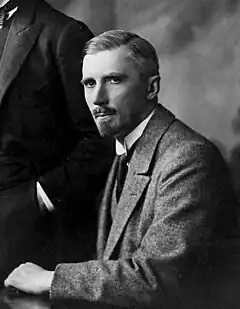Boris Petrovitch Babkin | |
|---|---|
 | |
| Born | 17 January 1877 |
| Died | 3 May 1950 (aged 73) |
| Nationality | Russian |
| Citizenship | British |
| Alma mater | Military Medical Academy |
| Known for | Babkin reflex |
| Awards | FRS[1] |
| Scientific career | |
| Fields | Physiology |
| Institutions | McGill University |
Boris Petrovitch Babkin FRS,[1] M.D., D.Sc, LL.D (Russian: Бори́с Петро́вич Ба́бкин; 17 January 1877 – 3 May 1950) was a Russian-born physiologist, who worked in Russia, England and Canada.[2][3][4][5]
Career
Babkin graduated from the Military Medical Academy, St. Petersburg, with a Doctor of Medicine degree in 1904.[2] He held professorships at the Novo-Alexandria Agricultural Institute and the University of Odessa,[3] before being imprisoned and exiled from Russia in 1922, due to his criticism of the October Revolution.[4]
He then spent two years in England, working at University College London under Ernest Starling,[4] before joining Dalhousie University, Nova Scotia, as Professor of Physiology.[3]
In 1928 Babkin became a research professor at McGill University, Montreal, under Prof John Tait,[6] where he spent the remainder of his career. He chaired the Physiology department between 1940 and 1941, following Tait's retirement, and, following his retirement, was invited to become Research Fellow of Neurosurgery by Wilder Penfield; a position he held until his death in 1950.[4]
In 1950, he was elected a Fellow of the Royal Society[1] for "his work on the digestive glands, conditioned reflexes and the cortical representation of autonomically innervated organs. He demonstrated that a) the three pancreatic enzymes are secreted in parallel, b) sympathetic and parasympathetic fibres innervate different cells in the salivary glands and c) histamine stimulates exclusively gastric parietal cells. His researches not only refuted Heidenhain's theory of "secretory" and "trophic" nerves but led to the conception of the elements of the digestive glands being activated by different nerves and hormones. Author of "Die aussere Sekretion der Verdauungsdrusen" and "Secretory Mechanism of the Digestive Glands"" [7] His personal papers are conserved at the McGill University Library in the collections of the Osler Library of the History of Medicine and the McGill University Archives.[8][9]
Honours
- 1904, Doctor of Medicine, Imperial Military Medical Academy
- 1924, Honorary Doctor of Science, University College London[2]
- 1943, Honorary Doctor of Letters, Dalhousie University[2]
- 1949, Friedenwald Medal, American Gastroenterological Association[2]
- 1950, Fellow of the Royal Society[1]
References
- 1 2 3 4 De Burgh Daly, Ivan; Komarov, S. A.; Young, E. G. (1952). "Boris Petrovitch Babkin. 1877-1950". Obituary Notices of Fellows of the Royal Society. 8 (21): 12–23. doi:10.1098/rsbm.1952.0002. JSTOR 768797. S2CID 178826891.
- 1 2 3 4 5 "Boris Petrovitch Babkin". Journal of Neurophysiology. 13 (5): 389–390. 1950. doi:10.1152/jn.1950.13.5.389. PMID 14774753.
- 1 2 3 "Professor Boris Babkin". Canadian Medical Association Journal. 20 (1): 55. 1929. PMC 1710358. PMID 20317176.
- 1 2 3 4 Beck, I. T. (2006). "The life, achievements and legacy of a great Canadian investigator: Professor Boris Petrovich Babkin (1877-1950)". Canadian Journal of Gastroenterology. 20 (9): 579–588. doi:10.1155/2006/745853. PMC 2659943. PMID 17001399.
- ↑ MacIntosh, F. C. (1951). "Boris Petrovich Babkin 1877-1950". Revue Canadienne de Biologie. 10 (1): 3–7. PMID 14834628.
- ↑ "History of the Department 1821-1949".
- ↑ "Library and Archive catalogue". Royal Society. Retrieved 14 March 2012.
- ↑ "Boris Babkin Fonds, P099". McGill Archival Collections Catalogue.
- ↑ "Boris Petrovitch Babkin Fonds, MG1071". McGill Archival Collections Catalogue.